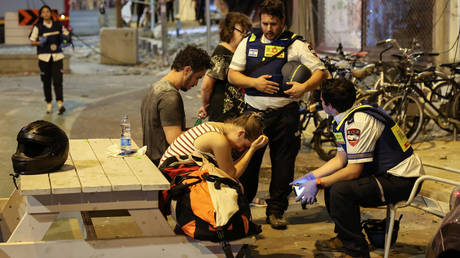
The latest war in the Holy Land offers no clear-cut victories, as civilians on both sides suffer from the effects of poor leadership
As war rages again in the Middle East, with Israel and Hamas vowing to exterminate each other, the one thing we can be sure of is that neither belligerent will achieve real victory or lasting peace. As usual, that’s probably not even the real goal for the so-called leaders on either side.
Israeli and Hamas officials both claim to be killing the bad guys in order to defend their people, but their actions seem to suggest otherwise. A Hamas official, for instance, told Al-Jazeera TV that the group’s October 7 cross-border attacks in southern Israel were necessary to defend “the dignity and freedom” of the Palestinian people. Israeli Prime Minister Benjamin Netanyahu pledged in response to “demolish Hamas” and to ensure that such attacks against his country’s people never happen again.
An examination of the tactics on both sides, past and present, shows that these bitter rivals have been either grossly misguided in trying to achieve their stated goals, or lying about their true motivations. Perhaps it’s some of both.
There was certainly no “dignity” or “freedom” being pursued when Hamas fighters stormed across the border in order to kill or capture as many civilians as possible. The terrorists murdered about 1,300 people, including babies in their beds, and took hundreds of hostages back to Gaza. Some of the gory details are in dispute, but it’s safe to say that Hamas purposely murdered non-combatants and kidnapped men, women and children.
It’s also safe to say that no sane leader could have supposed that such an atrocity would serve the interests of the Palestinian people. Hamas militants knew that civilians in Gaza City would pay a heavy price when Israel responded to the attacks, especially since the group has purposely stationed its command centers and weapons caches in or under apartment buildings, hospitals, mosques and schools. They also knew that their bloody rampage would leave the Palestinian people further away from a peace deal – perhaps further than ever – that would create their own state.
That’s by design, of course, because Hamas refuses to recognize Israel or seek any sort of two-state solution. The group’s original founding document called for the obliteration of Israel and the killing of Jews. Hamas aims to create a Palestinian state by force, “from the river to the sea.”
Knowing the genocidal ideology of Hamas and its track record of killing Israelis, it’s hard to fathom how the West Jerusalem government, supposedly so devoted to protecting its citizens, could allow the October 7 attacks to happen. Despite warnings from Egyptian officials, Israeli forces were caught off-guard and took hours to arrive at the scene. For example, concert-goers at a music festival where the terrorists killed an estimated 260 people reportedly had to wait more than six hours for help to arrive.
Hamas, which seized full control of Gaza in 2007, might not even exist had it not been helped by the Israeli government. Yitzhak Segev, the former Israeli military governor of Gaza, told a New York Times reporter that he had a budget to help finance Palestinian Islamists in the 1980s as a counterweight to the Palestine Liberation Organization and Yasser Arafat’s Fatah party. Another former Israeli official, Avner Cohen, told the Wall Street Journal that the government ignored his suggestion to “break up this monster before this reality jumps in our face,” instead playing the rival factions against each other.
Israel critics, such as Harvard professor emeritus Laurence Tribe, have suggested that Netanyahu allowed the Hamas attacks to happen, either in order to distract people from his political troubles or to justify a major operation against Gaza.
Whether any of that is true doesn’t really matter. Civilians were killed, and their government was either grossly incompetent or purposely asleep at the wheel. However any possible Israeli duplicity has no bearing on the guilt of Hamas, which chose to murder civilians and take hostages, rather than hitting military targets in retaliation for the Israeli oppression of the Palestinians.
Likewise, Hamas and its supporters have no right to dictate how Israel can respond. Some observers, such as Amnesty International, have argued that the Israeli retaliation has been “disproportionate.” After all, more than 4,700 Palestinians have been killed, compared with over 1,400 people in Israel.
However, Hamas started the latest war, and wars have consequences. Israel captured Gaza and the West Bank during its Six-Day War with three Arab nations in 1967. When you start a war, the enemy’s response isn’t about comparing body counts.
A proportionate – and absurd – response would be to send teams of Israeli commandoes into Gaza to murder the same number of civilians as the Hamas terrorists killed. Unlike Hamas, Israel isn’t launching attacks specifically aimed at killing non-combatants. It’s bombing Hamas targets, and heavy civilian casualties are a side effect of those strikes, partly because of the way the Islamist group has embedded its military operations in civilian areas.
Both sides are fighting PR wars to vilify the other side and claim moral superiority, in some cases by lying. Israel is doing itself no favors in the battle for public opinion when its air strikes kill thousands of Palestinian civilians. If Netanyahu’s government truly wanted to eradicate Hamas, minimize civilian casualties and protect the Israeli people from future attacks, it would have been much further along in doing so already. That would have meant launching a massive ground offensive to clear every tunnel, destroy every enemy weapon, and kill or capture every Islamist militant.
Israeli forces are preparing to finally launch their ground operation in Gaza, likely after negotiating the rules of engagement with Washington, but it’s doubtful that this war is about winning. This isn’t like World War II, when nations were locked in an existential struggle, and the victors vanquished their enemies by any means necessary. Rather, this war is more about geopolitical gamesmanship, political power and weakening useful enemies without eliminating them.
Caught in the middle are the Israeli and Palestinian people, who will bleed and die to serve the interests of their leaders. Those who survive will continue to live under threat of violence, bracing for the next flare-up.




